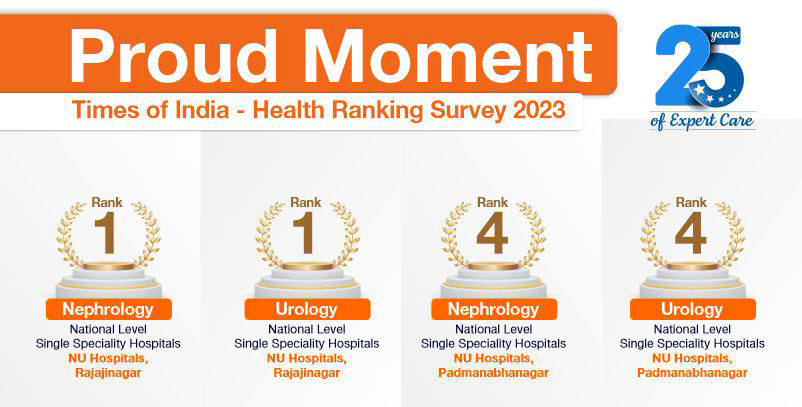Times Health Critical Care Survey - NU Hospitals ranked 1st for City , 2nd for Regional and 3rd for National in the field of Urology. Times Health Critical Care Survey - NU Hospitals ranked 6th for City in the field of Nephrology
Times Health Critical Care Survey - NU Hospitals ranked 1st for City , 2nd for Regional and 3rd for National in the field of Urology. Times Health Critical Care Survey - NU Hospitals ranked 6th for City in the field of Nephrology
Choose the Best Kidney Doctors from the Top Nephrology Hospital In Bangalore - NU Hospitals Who Can Release You From All Kidney Problems.
Years of Experience in Kidney Transplant
Urological Surgeries
Dialysis
Out-Patient consultations
#1 Ranking Nephrology-Urology Hospitals In Bengaluru By Times Of India
Expert Team of Top Urologists with World-Class Infrastructure
Committed Doctors Specialising In Kidney Transplants & Dialysis
Treatment For All Kidney Related Issues In Male & Female
Dedicated Sub-Specialty for Children’s Urinary Bladder Problems.
State-Of-The-Art Technology & Equipment
24/7 Facility for Dialysis, Radiology, Labs, Emergency Unit & Pharmacy

Partially replace kidney function
Poor quality of life
Done several times a week
More dietary restrictions
Less mobility
Less freedom to travel
With Dialysis, survival is shorter
Completely restores kidney function
Better quality of life
Last longer and lifetime
Less dietary restrictions
Greater mobility
How does it clean?
Frequency (When?)
Duration(How long?)
Mobility
Where?
Who will do the procedure?
Any complications?
Blood is circulated into a specialised filter using a hemodialysis machine
Receive treatment twice/thrice per week
Generally each session lasts 4 hours
Restrictions on mobility during dialysis procedure. Patient connected to machine and cannot move around
Treatment received at a hospital within a dedicated dialysis unit
Dialysis technicians
Fatigue, low blood pressure, need for catheter/ fistula
Specialised fluids are installed into the abdomen using a catheter. The waste fluid is drained at specified intervals
Continuous Ambulatory Peritoneal Dialysis (CAPD): Performed daily, fluids are exchanged manually. Entire process over 12 to 18 hours
Automated Peritoneal Dialysis (APD): Fluids are exchanged via machine or cycler when the patient is asleep (night time). Usually lasts overnight 8-10 hours
Patients can move around even with fluid inside the abdomen
Treatment received at home
The patient or family member. This chosen person will be trained by NU Hospitals Nephrology team.
Potential for infection in the catheter, weight gain, increased blood sugar level etc.